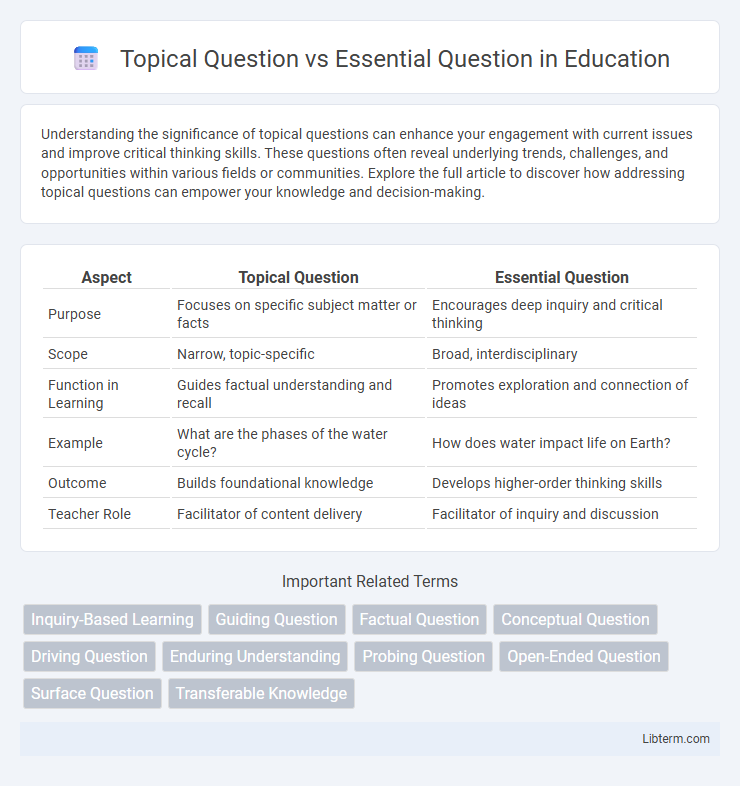Understanding the significance of topical questions can enhance your engagement with current issues and improve critical thinking skills. These questions often reveal underlying trends, challenges, and opportunities within various fields or communities. Explore the full article to discover how addressing topical questions can empower your knowledge and decision-making.
Table of Comparison
| Aspect | Topical Question | Essential Question |
|---|---|---|
| Purpose | Focuses on specific subject matter or facts | Encourages deep inquiry and critical thinking |
| Scope | Narrow, topic-specific | Broad, interdisciplinary |
| Function in Learning | Guides factual understanding and recall | Promotes exploration and connection of ideas |
| Example | What are the phases of the water cycle? | How does water impact life on Earth? |
| Outcome | Builds foundational knowledge | Develops higher-order thinking skills |
| Teacher Role | Facilitator of content delivery | Facilitator of inquiry and discussion |
Understanding Topical Questions
Topical questions target specific information within a subject, aiming to clarify details or facts related to a particular topic, such as "What causes photosynthesis in plants?" These questions help learners grasp focused concepts by narrowing the scope to manageable pieces of knowledge. Understanding topical questions enhances the ability to acquire precise information and build foundational knowledge efficiently.
Defining Essential Questions
Essential questions define the core ideas that guide inquiry and provoke deep thinking, often addressing foundational concepts within a subject area. Unlike topical questions that focus on specific facts or details, essential questions encourage critical analysis and ongoing exploration, fostering a deeper understanding. These questions are open-ended, broad, and timeless, serving as a framework for sustained learning and intellectual engagement.
Key Differences Between Topical and Essential Questions
Topical questions target specific facts or details within a subject, focusing on concrete information and straightforward answers. Essential questions explore broader themes and concepts, encouraging deep critical thinking and connecting ideas across disciplines. Key differences lie in scope and depth: topical questions address narrowly defined knowledge, while essential questions provoke inquiry that fosters understanding and lifelong learning.
Purpose and Scope of Topical Questions
Topical questions address specific aspects of a subject, focusing on detailed, narrow information to guide immediate inquiry or discussion. Their purpose is to explore particular facts, concepts, or processes within a defined scope, making them ideal for focused investigation. Topical questions often serve as building blocks for broader understanding by concentrating on individual elements of a larger topic.
The Role of Essential Questions in Learning
Essential questions serve as the foundation for deeper inquiry by stimulating critical thinking and connecting key concepts across subject areas, guiding students toward meaningful understanding. They encourage exploration and reflection, helping learners to synthesize knowledge rather than merely recalling facts associated with topical questions. The role of essential questions in learning is pivotal for fostering long-term retention and the application of skills in real-world contexts.
Examples of Topical Questions
Topical questions are specific inquiries that focus on particular details or facts within a subject, such as "What are the causes of the American Civil War?" or "How does photosynthesis occur in plants?" These questions guide learners to explore precise information and develop a deeper understanding of a topic's components. In contrast, essential questions are broader and encourage critical thinking about overarching themes, like "Why is the Civil War considered a turning point in American history?
Examples of Essential Questions
Essential questions provoke deep thinking and inquiry, such as "How does culture influence individual identity?" or "What are the ethical implications of technological advancements?" Unlike topical questions that address specific facts, essential questions encourage exploration of big ideas and enduring understandings central to a subject. These questions guide meaningful discussions and promote critical analysis across disciplines.
When to Use Topical vs Essential Questions
Topical questions target specific content within a unit or lesson, making them ideal for focused learning and knowledge checks during a curriculum segment. Essential questions drive inquiry across broader themes or concepts, promoting critical thinking and connections throughout an entire course or subject. Use topical questions for immediate comprehension and essential questions to foster long-term understanding and interdisciplinary exploration.
Impact on Critical Thinking and Inquiry
Topical questions narrow focus on specific content, encouraging detailed understanding and fact-based responses, which supports foundational knowledge. Essential questions promote broader inquiry by challenging learners to analyze, synthesize, and evaluate information, thereby enhancing critical thinking skills. This distinction impacts educational approaches by balancing direct knowledge acquisition with deeper cognitive engagement and problem-solving abilities.
Crafting Effective Topical and Essential Questions
Crafting effective topical questions requires specificity and clarity, focusing on particular content or facts to guide focused inquiry. Essential questions stimulate deeper thinking by addressing broader themes, encouraging analysis, synthesis, and reflection across multiple contexts. Balancing both types through precise language and purposeful scope enhances critical thinking and meaningful learning experiences.
Topical Question Infographic

 libterm.com
libterm.com